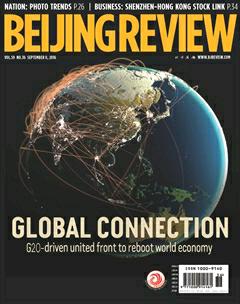Understanding China Through Keywords
2016-09-28
Understanding China Through Keywords
Learning keywords is one of the best ways to keep abreast of the latest developments in a country. The China Academy of Translation, a research institute affiliated with the China International Publishing Group, the country’s leading international publisher, regularly analyzes prevailing Chinese terms in various sectors and translates them into a number of foreign languages ranging from English to Arabic. In each issue, Beijing Review presents a selection of these keywords to help readers know more about China.
Governing a large state is like cooking a small fish: it must be handled with great care
The adage “governing a large state is like cooking a small fish” comes from Daodejing by Laozi, an ancient Chinese thinker. Just as cooking a small fish requires careful heat control, the right seasoning, and a minimal amount of stirring, governing a large state is a delicate balancing act that must be performed with the highest level of care. Responding to a question from a Brazilian reporter in March 2013, President Xi Jinping said that leaders must develop a clear understanding of the complexity of their country’s realities and the diversified needs of their people. They must, he continued, be aware that governing a country is like “treading on thin ice or standing upon the edge of an abyss.” It was essential, he added, to exercise extreme care and due diligence at all times in performing government functions, in the same manner as people cook small fish.
Modernizing the national governance system and capabilities
The national governance system comprises a full array of interlocking and mutually supplementary mechanisms that address economic, political, cultural, social, ecological, and Party-building issues, as well as legal and normative frameworks.
The national governance capabilities refer to the ability to use the national system to manage state affairs, including domestic and foreign affairs, and issues associated with reform, development, stability, and national defense and to pursue efforts to build an exemplary Party, a prosperous country, and a strong military.
The modernization of the national governance system and capabilities should follow the socialist path with Chinese characteristics. Efforts should be made to foster and promote the core values of Chinese socialism and accelerate the building of a values system that fully captures what China is, what the Chinese nation stands for, and what our mission today calls for.
The Chinese wisdom of crossing the river by feeling for stones
Crossing the river by feeling for stones is a distinctly Chinese approach to reform, one that embodies Chinese wisdom in addressing issues specific to contemporary China. It calls for prudence in feeling our way forward in unfamiliar territory and testing the waters before a major course of action aimed at achieving breakthroughs is launched. It encourages innovation, exploration, and trailblazing efforts while at the same time emphasizing the importance of identifying and promoting best practices on the basis of lessons learned.
This is how China’s reform and opening-up drive has proceeded in the past three decades. It has been a gradual process, starting with pilot programs, followed by larger campaigns to transplant and replicate success stories after careful analysis of their outcomes. The process has spread from the countryside to the cities, from coastal areas to the interior, and from local projects to nationwide implementation. Such an incremental approach can help prevent the potential social upheaval that could accompany an inappropriate major move resulting from lack of understanding of its implications. It ensures steady progress in moving ahead with our reform and in achieving our objectives. Not only was this approach applicable to the initial phases of reform and opening up, it is also relevant in today’s context, as China drives the reform to a deeper level.
Comments to yanwei@bjreview.com
